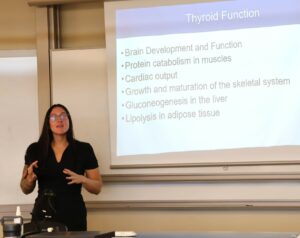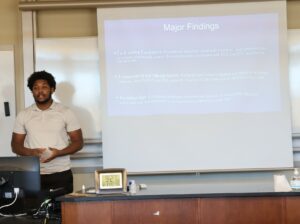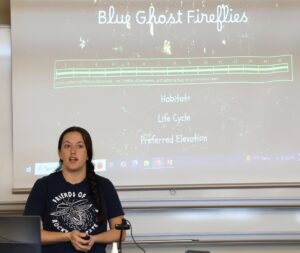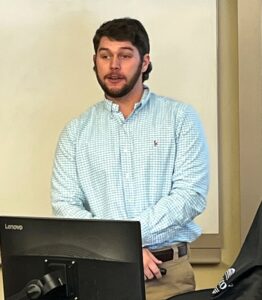GREENEVILLE – Seniors in Tusculum University’s natural sciences program have taken another step forward in becoming career-ready professionals with special presentations made to faculty members and fellow students.

Katie Murphy makes her presentation “Environmental Toxins That Disrupt the Thyroid Gland.”

Jalen Hurt delivers his presentation “How Can Sickle Cell Disease or Sickle Cell Trait Be Affected by Other Disorders?”
The biology, chemistry and environmental science programs held their senior seminar Friday, Dec. 6, in the state-of-the-art Meen Center. Fifteen students who will be graduating during this academic year presented their research on subjects and answered questions for 20 minutes apiece. Among the presentations were “Appalachian Nightlights: The Firefly Experience,” “The Potential Genetic Causes of Alzheimer’s,” “How Running Alters the Foot,” “How Can Sickle Cell Disease or Sickle Cell Trait Be Affected by Other Disorders?” and “The Formations and Patterns of Human Fingerprints.”
The presentations were the last stage in a two-course seminar series the students had taken to prepare them to share their knowledge on a topic in a way the average lay person would understand. Jordan Baker, assistant professor of biology, said the presentation method Tusculum students learn is one reason they have good placement rates in graduate and professional schools after graduation.
“These courses are challenging and pushed me as a student, but I feel more prepared going into graduate school,” said Katie Murphy, one of the presenters. “I am a senior majoring in biology, and I will be going to physician assistant school following graduation. These courses will truly benefit me going forward as they allowed me to become confident in my research abilities, discover more about my strengths and weaknesses and establish how my experiences and passions set me apart.”
Jalen Hurt, another presenter, is pursuing a biology degree, with a pre-medical concentration, with plans to become a hematologist oncologist. He said the seminar courses were highly beneficial.
“They helped me improve my ability to research, organize and communicate complex ideas effectively,” Hurt said. “These courses emphasized critical thinking, time management and the importance of adjusting content to an audience, skills that were instrumental in preparing for the presentation.”
The goal of the seminar courses
Dr. Chuck Pearson, assistant dean of math and science, said the seminar courses and presentations are designed to help students share their knowledge in the most understandable manner and align with the university’s mission.
“One of the core things we want to ensure our students are prepared to be is good citizens of the communities, the states and the planet in which they live,” Dr. Pearson said. “Part of the responsibility of educated scientists going into their communities is to be able to talk about their science in a way that is relevant.

Montana Bremerman discusses her topic “Appalachian Nightlights: The Firefly Experience.”
“That capacity to communicate well is also an employable skill. For those who pursue graduate studies, that ability to communicate well makes them more successful. What we’re trying to accomplish with this population of students is to build their capacity to be good communicators.”
Dr. Pearson said quality communication about scientific information is not commonplace in the industry – even among individuals with doctorate degrees.
“It’s important for scientists to be able talk one another about their science, and it’s important for scientists to be able to talk to the general public about their science – and to do so in a way that is understandable,” he said. “Having our students understand and demonstrate that skill is my biggest goal programmatically for this seminar.”
The best examples of the presentations achieving that outcome were students who communicated a core idea to their peers, who learned something new, became enthused and posed questions that demonstrated their curiosity and helped build their understanding of the subject at hand, Dr. Pearson said.
Baker said scientists are always asking why something happened and why people should care.
“That’s the story we try to get students to understand as they are giving these presentations,” Baker said. “We have to talk to the general public about why they should care about the subject. It’s one thing for scientists or science students to talk to each other because all of them have a more complete understanding of the topic upfront.
“But when students give one of these seminar presentations to science professors as well as staff members and peers who are not studying the sciences, they need to tailor their presentation to that audience. We want our students to be able to go out and talk to their peers in science but also their peers who are not scientists.”
Details about the seminar courses
Students who make these presentations each December have taken a junior seminar class in the spring before completing the senior seminar course in the fall. Baker said they have learned about reading scientific articles and other research elements as early as freshman year, but the seminar courses provide a deeper dive that prepares them for the senior seminar presentation.
As juniors, they settle on their research topic, which can derive from a class project or something that personally interests them, has affected them or is a career passion. They also learn how to make a scientific presentation and start the process of critiquing scientific articles.

Caid Sanders presents “HPAI in Domesticated Animals.”
When they move to the senior seminar, students examine the scientific articles in greater depth by presenting their perspective to the class. That helps them advance toward the December presentation, which is built off research from 10 or more scientific articles. Students also give practice presentations and watch four or five good and bad ones by scientists to help them recognize the do’s and don’ts of effective talks. They also complete workshop hours with the class teacher and receive assistance from other faculty mentors.
“It is a long process, to say the least, but in the end, it truly pays off,” Murphy said. “Not only are the courses research-focused, but you also get an opportunity to create résumés, fill out sample applications and get introduced to the interview process for jobs and graduate school.”
Hurt, who plans to seek a master’s in biomedical science or obtain more shadowing hours after graduation while he prepares to take the Medical College Admission Test, highlighted the value of pre-presentation process.
“The preparation for the presentation, including the practice sessions and feedback cycles, taught me how to present confidently, use visual aids effectively and manage nerves,” he said. “These experiences will undoubtedly benefit me in my career or graduate school. Research presentation is a big part of medicine, and the art of effectively communicating information to colleagues or patients will be crucial on my journey as a hematologist oncologist.”
In addition to Murphy and Hurt, the students who presented were Madison Adkins, Montana Bremerman, Aeron Burhardt, Makayla Bush, Maddie Creswell, Skylar Georges, Skylar Lane, Landen Locklear, Carter Morelock, Emily Mosley, Caid Sanders, Taylor Sanders and Whitney Thompson. You can read their presentation titles at https://bit.ly/3ZpySOz. Murphy said it was incredible to see how varied each student’s research was even though all of the presenters are studying in the natural sciences.
More information about the university and its natural sciences program is available at www.tusculum.edu.


